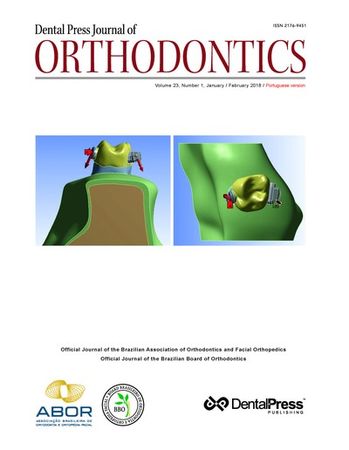
Seu carrinho está vazio!
Introduction: Treatment of maxillofacial injuries is complex and requires the establishment of a comprehensive and accurate diagnosis and correct treatment planning. Objective: The objective of this case report was to describe the re-treatment of a 27-year-old woman who was involved in a severe car accident that resulted in the loss of five anterior teeth and alveolar bone, and whose previous orthodontic and surgical treatments had been unsuccessful. Case report: In this case, the space for...




It was quite a painful process to understand that self-teaching is necessary in Orthodontics. I have always enjoyed teachers, tutors or someone who could hold my hand to give me the confidence to embrace new methods, techniques or procedures. Yet, the speed of progress in the health area does not allow for regular academic learning, it barely waits for the publication of a book. The true source for our continuing education lies in scientific journals. They are the perfect place to find the...

Orthodontics has undergone a profound transformation since the skeletal anchorage became part of treatment plans. More specifically, orthodontic mini-implants presented by Kanomi in 1997 allowed us to achieve encouraging results when the anchorage subject is taken into account. Over the last decade, we have seen a revolution in the way we were accustomed to using the mini-screws allocated primarily in inter-radicular areas, that is, between the roots to reinforce anchorage during orthodontic...

Rapid maxillary expansion is without a doubt the most commonly used facial orthopedic procedure in the world. The benefits derived from this therapy are diverse, ranging from aesthetic improvements to functional and respiratory ones. When thinking about respiratory changes, we ought to also reflect about voice alterations. It is known that voice formation is a complex physiological process involving the interaction among respiration, the larynx and resonance systems. With this in mind,...

Dental arches areas with teeth presenting dentoalveolar ankylosis and replacement root resorption can be considered as presenting normal bone, in full physiological remodeling process; and osseointegrated implants can be successfully placed. Bone remodeling will promote osseointegration, regardless of presenting ankylosis and/or replacement root resorption. After 1 to 10 years, all dental tissues will have been replaced by bone. The site, angulation and ideal positioning in the space to...

Introduction: The force applied to the teeth by fixed orthopaedic expanders has previously been studied, but not the force applied to the orthodontic mini-implant (OMI) used to expand the maxilla with Hyrax hybrid expanders (HHE). Objective: The aim of this article was to evaluate the clinical safety of the components (OMI, abutment and double wire arms) of three different force-transmitting systems (FTS) for conducting orthopaedic maxillary expansion: Jeil Medical & Tiger Dental™,...

Objective: This study aimed at evaluating whether changes in the insertion angle is a determining factor in the positioning of the miniscrews body in a region with larger interradicular space in the posterior maxilla. Methods: Analysis of 60 posterior maxillary quadrants were made using images obtained by means of cone-beam computed tomographic image (CBCT), with 0.076-mm voxel, which presented a real miniscrew inserted in the mesial region of the maxillary first molars, serving as reference...

Objective: To determine the relationship between symphysis dimensions and alveolar bone thickness (ABT) of the mandibular anterior teeth. Methods: Cone-beam computed tomography images of 51 patients were collected and measured. The buccal and lingual ABT of the mandibular anterior teeth was measured at 3 and 6 mm apical to the cemento-enamel junction (CEJ) and at the root apices. The symphysis height and width were measured. The symphysis ratio was the ratio of symphysis height to symphysis...

Objective: The aim of his study was to evaluate the stress on tooth and alveolar bone caused by orthodontic intrusion forces in a supraerupted upper molar, by using a three-dimensional Finite Element Method (FEM). Methods: A superior maxillary segment was modeled in the software SolidWorks 2010 (SolidWorks Corporation, Waltham, MA, USA) containing: cortical and cancellous bone, supraerupted first molar, periodontal tissue and orthodontic components. A finite element model has simulated...

Objective: To assess the impact of two early treatment protocols for anterior dental crossbite on children’s quality of life. Methods: Thirty children, 8 to 10 years of age, with anterior dental crossbite, participated in this study. Individuals were divided into two groups: Group 1 – 15 children undergoing treatment with an upper removable appliance with digital springs; Group 2 – 15 children undergoing treatment with resin-reinforced glass ionomer cement bite pads on the lower first...

Introduction: The surgically assisted rapid maxillary expansion is a procedure that reduces the resistance of the sutures correcting the posterior crossbite in adults. Objective: The aim of this study was to evaluate the periodontal status of 17 adults submitted to this procedure. Methods: The clinical attachment level (CAL), gingival recession, attached gingiva and bleeding were evaluated in maxillary first premolars and molars, central and lateral incisors of right and left sides before...

Tooth transposition is one of the most difficult dental anomalies to treat in the dental clinic. Several factors must be taken into account with a view of making the best decision. The aim of this study was to discuss treatment modalities for tooth transposition, their advantages and disadvantages. Additionally, it aims at presenting a clinical case of transposition between canine and lateral incisor in the upper quadrant on the right side. The treatment of choice was extraction of one...

Introduction: The T-loop as designed by Burstone is a space closure spring used in the rational application of orthodontic biomechanics. Despite the diversity of studies, there is still no consensus on the optimal parametric characteristics for its conformation. Objective: This study aimed at reviewing the literature on the force systems released by different conformations of the T-loop, according to the type of anchorage and the main characteristics and factors that influence them. Results:...

Copyright © 1998 - 2022 DentalGO | Todos Direitos Reservados. DentalGO é uma marca Dental Press